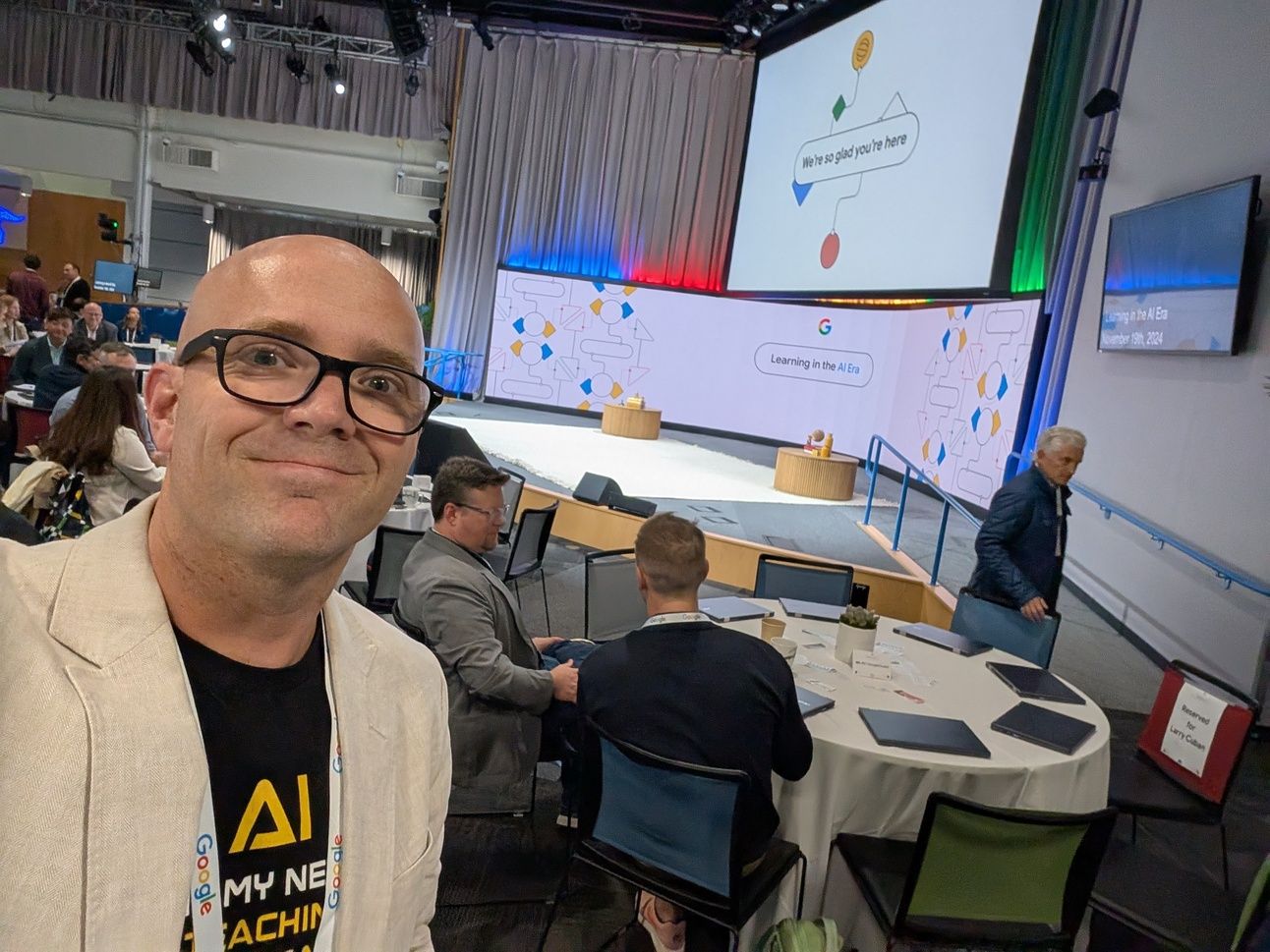

A smile from “Learning in the AI Era” at Google HQ in Mountain View, Calif.
I got an invite to Google’s “Learning in the AI Era” event at the Googleplex in California.
After some consideration (I paid for my travel from Indiana, so not cheap!) I decided to go.
It was a day full of panel discussions, presentations, and product demos. (And a nice lunch of chicken al pastor tacos.)
Here’s why it was a win for me (and, I believe, for YOU) …
I got to hear Google employees talk candidly about their work with AI — and their priorities on it.
They brought people from education and other industries to discuss what we should be doing with AI for learning.
It offered a broader view of learning — “across professional, academic, and informal contexts” — which was a good perspective outside our K-12 (and higher ed) bubble.
I’m going to unpack my notebook with information and insight that I think might be helpful in your role of guiding your organization regarding AI.
Two quick funny stories:
The event was Tuesday. I presented at a fantastic librarians event in Indiana on Monday. I drove there from home — but forgot my backpack with my laptop in it! Had to scramble to recreate slides for my conference keynote. And it meant I didn’t have my laptop with me on my Google trip at all. Silver lining: It was a fun change of pace to try to fill up a brand new notebook with handwritten notes.
If you follow Tyler Tarver (Tarver Academy) on social media, I got to chat with him in the afternoon — but had no idea I was sitting behind him all morning! (He’s in navy blue right over my shoulder in that selfie above.)
In this week’s newsletter:
🗳 Poll: Define “original work”
💡 Insights from “Learning in the AI Era” at Google
📚 New AI resources this week
🗳 Poll: Define “original work”
This week’s question: How do you define "original work" in the age of AI?
⬜️⬜️⬜️⬜️⬜️⬜️ Completely AI-generated (4)
⬜️⬜️⬜️⬜️⬜️⬜️ AI-generated, human adjustments (7)
🟨🟨🟨⬜️⬜️⬜️ A collaborative effort (equal AI and human) (35)
🟩🟩🟩🟩🟩🟩 Human-generated, AI adjustments (61)
🟨⬜️⬜️⬜️⬜️⬜️ Completely human-generated (13)
⬜️⬜️⬜️⬜️⬜️⬜️ "Originality" is irrelevant in the age of AI (6)
The responses to these were INCREDIBLE.
I don’t always do this, but I downloaded ALLLLLLL of your responses and put them in this document. They were that good.
It was hard to get the question right — and my attempt was admittedly a bit clunky. Some of you mentioned that in your responses (thanks Rickard from Sweden — I didn’t take offense!).
Some of your responses:
Voted “A collaborative effort”: I could easily choose any of these answers, depending on the lens I used. … As for why I chose "A collaborative effort" is because as we move forward AI should at least decrease the inefficiencies, if not help us find our blind spots and dig deeper on performance based projects.
Voted “Completely human generated”: I guess I consider "original work" as the work done by one person. I also wouldn't consider a novel that has gone through a team of editors the author's "original work" either.
Voted “Human-generated, AI adjustments”: Whatever I use that appeals to me, I am always in the state of mind that validation and evaluation of the AI responses are prevalent. As far as originality" being irrelevant in the age of AI, when AI can create something genuine and totally new by itself, well,... Let's answer that question as time goes on.
Voted “A collaborative effort”: Maybe 'original work' in the age of AI can best be understood as a spectrum because the advent of AI has us rethinking traditional concepts of creativity, originality and authorship.
🗳 This week’s poll
This is another admittedly clunky question. (Transparency: I spent so much time creating the main content that I had to hurry through this part. Sorry!)
Hoping that you’ll tell us your most-used tool — and why/how you use it — in the comments!
Instructions:
Please vote on this week’s poll. It just takes a click!
Optional: Explain your vote / provide context / add details in a comment afterward.
Optional: Include your name in your comment so I can credit you if I use your response.
Which AI tool do you use the most?
💡 Insights from “Learning in the AI Era” at Google

AI learning panel discussions with Googlers
I think I expected this event to be “AI in education” … like traditional K-12 and higher ed.
But it wasn’t. It was more focused on learning overall. K-12 and HE were represented, but it extended to learning in the workplace, personal outside-of-school learning, even learning later in life.
It meant I had to translate some of it in my brain to our traditional education system, but it was a good perspective. We need to remember that we’re a cog in a bigger wheel of learning. (Multiple cogs, but still part of a whole.)
The day was organized into three parts: a keynote speech (of sorts), panel discussions, and product demos.
Keynote speech: The “Learn Arena”
This wasn’t billed as a keynote speech per se, but it was one guy addressing the whole room.
The guy — Andrew Miller from Interbrand — described a new report that’s coming from Google regarding its initiatives in learning and AI.
Here are some things he said …
A key concept for learning in the future — learning how to question. When answers are more accessible than ever, the questions we ask will be crucial.
An important part of that questioning — curiosity. The slogan of their learning initiative is: “The future belongs to the curious.” I think it’s a good north star for the big picture in education.
We believe education is key to success … but confidence in traditional education is waning. This is based on their data gathered from people all over the globe.
An abundance of information doesn’t equal access to learning. We need focus … curation … credible sources. He said we could stack up enough CDs (compact discs, remember) to wrap around the world 22 times with the information available in the world. But what are we doing with it — and how do we find what we need?
We don’t have to stick with the traditional career trajectory. We have opportunities to do more than just one job our whole lives. Plus, we can include older generations who often feel locked out of learning.
Google unveiled LearnLM, a series of new AI models that are “fine-tuned for learning and grounded in educational research.” These models are already integrated into Google tools like Search, YouTube, and Gemini … and will further be dispersed into tools that teachers and students commonly use.

A panel of Googlers at Learning in the AI Era at the Googleplex
Panel discussions: Googlers, educators, and others
I sat in on four (!!) panel discussions about learning in the AI era. As you can imagine, some parts were much more interesting than others.
Here are some memorable moments …
In search phrase “AI for ____” in Google search, “AI for teachers” was #1, according to Lisa Gevelber from Grow with Google.
Some words Maureen Heymans (a Google VP) used to describe good AI-assisted learning: active, apply, struggle, adaptive, multimodal, engaging, building understanding.
Note: We educators use lots of those terms, too, but it’s good to hear developers using them to describe their vision, I think.
Google has released a free course called “Generative AI for Educators,” a collaboration between Grow with Google and MIT RAISE Initiative.
If you haven’t tried out NotebookLM yet, it’s incredible! (I wrote about it here.) Steven Johnson, NotebookLM’s editorial director, said they built it to help “explore complex, dense sources conversationally.”
Johnson was asked for two of the wildest NotebookLM example uses he’s heard.
1: Writers workshops, where writers upload their work and get coached from various perspectives — including an audio overview podcast episode critique of it.
2: Upload diaries and journals (from yourself or ancestors) and get an audio overview podcast episode about them. 😳
LLMs like Gemini and ChatGPT are good at creating schema to describe a structure of something, said Ben Gomes, Google’s senior VP for learning and sustainability.
Why I thought this was interesting: You can give an LLM a bunch of information and ask it to create a framework or plan — a blueprint of sorts — to better help you understand it. I’ve used it for analogies, which is similar, but this seems to be bigger and more powerful to me.
“AI literacy is a ticket on a train to the future.” — Ronit Levavi Morad, Google’s program manager for research
This could be seen as a buzz phrase, but I like it. AI isn’t the future. But when students are AI literate, it opens doors to things they couldn’t open otherwise.
Abstraction is a concern with AI in education, said Ben Kornell of EdTech Insiders. When we talk about it too abstractly, we often aren’t even discussing the same thing. Use specifics.
Some product demos that caught my eye
During breaks and meals, there were 11 product demo booths. I went to every one! Some aren’t released, so I can’t talk about those, but here are a few to check out …
Illuminate — This is the core product that creates the mind-blowing podcast-style interviews in NotebookLM that have gone viral. It lets you create discussions between AI hosts about your source material.
LearnAbout — It’s a simple tool that lets you explore your curiosity through learning — in a more engaging, learning-centric format than an LLM like Gemini or ChatGPT. (Note: Terms of use are 18+ but I was told they hope to lower it for access to K-12 eventually.)
Google Arts and Culture — A&C isn’t anything new, but they have three AI-driven products that are really cool …
Mice in the Museum: A fun tour of a museum with curious mouse tour guides
Talking Tours: An AI tour guide takes you to cultural landmarks around the world
Art Selfie 2: Available in the A&C mobile app, it transforms your selfies into various styles of art (and teaches you about them)
Read Along — A tool that listens to students as they read and analyze their pronunciation, comprehension, and more. (Read Along in Google Classroom assignments is a premium feature. The web version appears to be free.)
📚 New AI resources this week
1️⃣ Office workers fear that ai use makes them seem lazy (via Tech Brew): This is an issue with students with their teachers (and teachers with their admins!). It’s a discussion we should have.
2️⃣ Despite its impressive output, generative AI doesn’t have a coherent understanding of the world, researchers suggest (via Tech Xplore): It’s all a statistical guess based on training and data in the dataset.
3️⃣ Job interview hack on TikTok (via OfferGoose): This came across my feed. Cell phone suctioned to the screen? It’s going to be in headphones and eyeglasses eventually. This is just the beginning. Gotta ask … what are we doing, why are we doing it, and how are we measuring it?
I hope you enjoy these resources — and I hope they support you in your work!
Please always feel free to share what’s working for you — or how we can improve this community.
Matt Miller
Host, AI for Admins
Educator, Author, Speaker, Podcaster
[email protected]


